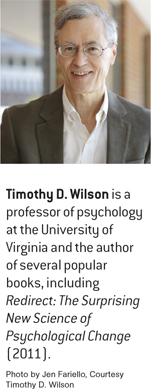2.4 The Ethics of Science: First, Do No Harm
Somewhere along the way, someone probably told you that it isn’t nice to treat people like objects. And yet, it may seem that psychologists do just that by creating situations that cause people to feel fearful or sad, to do things that are embarrassing or immoral, and to learn things about themselves and others that they might not really want to know. Don’t be fooled by appearances. The fact is that psychologists go to great lengths to protect the well-
Respecting People
During World War II, Nazi doctors performed truly barbaric experiments on human subjects, such as removing organs from living people or submerging people in ice water just to see how long it would take them to die. When the war ended, the international community developed the Nuremberg Code of 1947 and then the Declaration of Helsinki in 1964, which spelled out rules for the ethical treatment of human subjects. Unfortunately, not everyone obeyed them. For example, from 1932 until 1972, the U.S. Public Health Service conducted the infamous Tuskegee experiment in which 399 African American men with syphilis were denied treatment so that researchers could observe the progression of the disease.
48
In 1979, the U.S. Department of Health, Education, and Welfare (HEW) released what came to be known as the Belmont Report, which described three basic principles that all research involving human subjects should follow. First, research should show respect for persons and their right to make decisions for and about themselves without undue influence or coercion. Second, research should be beneficent, which means that it should attempt to maximize benefits and reduce risks to the participant. Third, research should be just, which means that it should distribute benefits and risks equally to participants without prejudice toward particular individuals or groups.
The specific ethical code that psychologists follow incorporates these basic principles and expands them. Here are a few of the most important rules that govern the conduct of psychological research:
What are three features of ethical research?
- Informed consent: Participants may not take part in a psychological study unless they have given informed consent, which is a written agreement to participate in a study made by an adult who has been informed of all the risks that participation may entail. This doesn’t mean that the person must know everything about the study (e.g., the hypothesis), but it does mean that the person must know about anything that might potentially be harmful or painful. If people cannot give informed consent (e.g., because they are minors or are mentally incapable), then informed consent must be obtained from their legal guardians.
informed consent
A written agreement to participate in a study made by an adult who has been informed of all the risks that participation may entail.
- Freedom from coercion: Psychologists may not coerce participation. Coercion not only means physical and psychological coercion but monetary coercion as well. It is unethical to offer people large amounts of money to persuade them to do something that they might otherwise decline to do.
- Protection from harm: Psychologists must take every possible precaution to protect their research participants from physical or psychological harm. If there are two equally effective ways to study something, the psychologist must use the safer method.
- Risk-
benefit analysis: Although participants may be asked to accept small risks, such as a minor shock or a small embarrassment, they must not even be asked to accept large risks, such as severe pain or psychological trauma. The psychologist must also demonstrate that even the small risks are outweighed by the social benefits of the new knowledge that might be gained from the study. - Deception: Psychologists may only use deception when it is justified by the study’s scientific, educational, or applied value and when alternative procedures are not feasible.
- Debriefing: If a participant is deceived in any way before or during a study, the psychologist must provide a debriefing, which is a verbal description of the true nature and purpose of a study.
debriefing
A verbal description of the true nature and purpose of a study.
- Confidentiality: Psychologists are obligated to keep private and personal information obtained during a study confidential.
These are just some of the rules that psychologists must follow. But how are those rules enforced? Almost all psychology studies are done by psychologists who work at colleges and universities. These institutions have institutional review boards (IRBs) that are composed of instructors and researchers, university staff, and laypeople from the community (e.g., business leaders or members of the clergy). A psychologist may conduct a study only after the IRB has reviewed and approved it. The code of ethics and the procedure for approval are so strict that many studies simply cannot be performed anywhere, by anyone, at any time because doing so would require unethical experiments that violate basic human rights.
49
Respecting Animals
What steps must psychologists take to protect nonhuman subjects?
Not all research participants have human rights because not all research participants are human. Some are chimpanzees, rats, pigeons, or other nonhuman animals. The psychologist’s ethical code specifically describes the special rights of these nonhuman participants, and some of the more important ones are these:

- All procedures involving animals must be supervised by psychologists who are trained in research methods and experienced in the care of laboratory animals and who are responsible for ensuring appropriate consideration of the animal’s comfort, health, and humane treatment.
- Psychologists must make reasonable efforts to minimize the discomfort, infection, illness, and pain of animals.
- Psychologists may use a procedure that subjects an animal to pain, stress, or privation only when an alternative procedure is unavailable and only when the procedure is justified by the scientific, educational, or applied value of the study.
- Psychologists must perform all surgical procedures under appropriate anesthesia and must minimize an animal’s pain during and after surgery.
That’s good—
50

Respecting Truth
Institutional review boards ensure that data are collected ethically. But once the data are collected, who ensures that they are ethically analyzed and reported? No one does. Psychology, like all sciences, works on the honor system. You may find that a bit odd. After all, we don’t use the honor system in stores (“Take the television set home and pay us next time you’re in the neighborhood”), banks (“I don’t need to look up your account—
Definitely! Okay, we just made that up. But the honor system doesn’t depend on scientists being especially honest as much as it depends on the fact that science is a community enterprise. When scientists claim to have discovered something important, other scientists don’t just applaud; they start studying it too. When physicist Jan Hendrik Schön announced in 2001 that he had produced a molecular-
Other Voices: Is Psychology a Science?
Is Psychology a Science?

Nobody can dispute that you are taking a course in psychology, but are you taking a science course? Some critics maintain that psychology fails to meet accepted criteria for what constitutes a science. Timothy Wilson, a psychology professor at the University of Virginia, took on the critics by drawing from an appropriate source: the scientific literature (Wilson, 2012).
Once, during a meeting at my university, a biologist mentioned that he was the only faculty member present from a science department. When I corrected him, noting that I was from the Department of Psychology, he waved his hand dismissively, as if I were a Little Leaguer telling a member of the New York Yankees that I too played baseball.
There has long been snobbery in the sciences, with the “hard” ones (physics, chemistry, biology) considering themselves to be more legitimate than the “soft” ones (psychology, sociology). It is thus no surprise that many members of the general public feel the same way. But of late, skepticism about the rigors of social science has reached absurd heights. The U.S. House of Representatives recently voted to eliminate funding for political science research through the National Science Foundation (NSF). In the wake of that action, an opinion writer for the Washington Post suggested that the House didn’t go far enough. The NSF should not fund any research in the social sciences, wrote Charles Lane, because “unlike hypotheses in the hard sciences, hypotheses about society usually can’t be proven or disproven by experimentation.”
Lane’s comments echoed ones by Gary Gutting in the Opinionator blog of the New York Times. “While the physical sciences produce many detailed and precise predictions,” wrote Gutting, “the social sciences do not. The reason is that such predictions almost always require randomized controlled experiments, which are seldom possible when people are involved.”
This is news to me and the many other social scientists who have spent their careers doing carefully controlled experiments on human behavior, inside and outside the laboratory. What makes the criticism so galling is that those who voice it, or members of their families, have undoubtedly benefited from research in the disciplines they dismiss.
Most of us know someone who has suffered from depression and sought psychotherapy. He or she probably benefited from therapies such as cognitive behavioral therapy that have been shown to work in randomized clinical trials.
Problems such as child abuse and teenage pregnancy take a huge toll on society. Interventions developed by research psychologists, tested with the experimental method, have been found to lower the incidence of child abuse and reduce the rate of teenage pregnancies.
Ever hear of stereotype threat? It is the double jeopardy that people face when they are at risk of confirming a negative stereotype of their group. When African American students take a difficult test, for example, they are concerned not only about how well they will do but also about the possibility that performing poorly will reflect badly on their entire group. This added worry has been shown time and again, in carefully controlled experiments, to lower academic performance. But fortunately, experiments have also showed promising ways to reduce this threat. One intervention, for example, conducted in a middle school, reduced the achievement gap by 40%.
If you know someone who was unlucky enough to be arrested for a crime he didn’t commit, he may have benefited from social psychological experiments that have resulted in fairer lineups and interrogations, making it less likely that innocent people are convicted.
An often-
All three of these programs have been shown, with well-
To be fair to the critics, social scientists have not always taken advantage of the experimental method as much as they could. Too often, for example, educational programs have been implemented widely without being adequately tested. But increasingly, educational researchers are employing better methodologies. For example, in a recent study, researchers randomly assigned teachers to a program called My Teaching Partner, which is designed to improve teaching skills, or to a control group. Students taught by the teachers who participated in the program did significantly better on achievement tests than did students taught by teachers in the control group.
Are the social sciences perfect? Of course not. Human behavior is complex, and it is not possible to conduct experiments to test all aspects of what people do or why. There are entire disciplines devoted to the experimental study of human behavior, however, in tightly controlled, ethically acceptable ways. Many people benefit from the results, including those who, in their ignorance, believe that science is limited to the study of molecules.
Wilson’s examples of psychological investigations that have had beneficial effects on society are excellent, but perhaps even more important is his point that much of psychology is based on carefully controlled experimentation using randomization procedures that the critics apparently believe—
Wilson, T. D. (July 12, 2012). Stop Bullying the “Soft” Sciences. In The Los Angeles Times. Copyright 2012 Timothy D. Wilson and Sherrell J. Aston. Reproduced by permission.
51
What are psychologists expected to do when they report the results of their research?
What exactly are psychologists on their honor to do? At least three things. First, when they write reports of their studies and publish them in scientific journals, psychologists are obligated to report truthfully on what they did and what they found. They can’t fabricate results (e.g., claiming to have performed studies that they never really performed) or fudge results (e.g., changing records of data that were actually collected), and they can’t mislead by omission (e.g., by reporting only the results that confirm their hypothesis and saying nothing about the results that don’t). Second, psychologists are obligated to share credit fairly by including as co-
52
SUMMARY QUIZ [2.4]
Question 2.11
| 1. | Informed consent… |
- is only required when testing animals.
- requires that people must know everything about a study before agreeing to participate.
- can only be given by an adult.
- is usually obtained orally rather than in writing.
c.
Question 2.12
| 2. | What is debriefing? |
- A promise of confidentiality.
- The requirement to share data with other scientists.
- The prohibition against fabricating results.
- A description of the true nature and purpose of a study that is given to a participant after the study has ended.
d.
Question 2.13
| 3. | What are psychologists ethically required to do when reporting research results? |
- report findings truthfully
- share credit for research
- make data available for further research
- all of the above.
d.